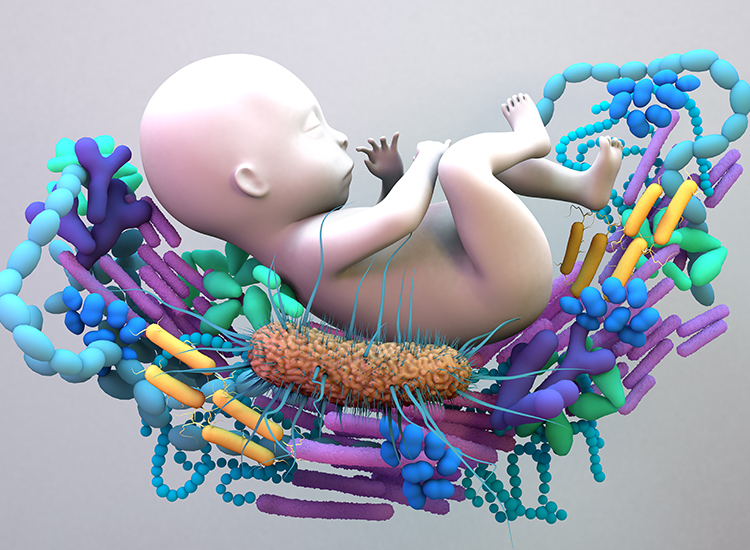Immunity
& Microbiota
Ecology

Host immunity is installed in early-life perfectly synchronized with initial colonization of the human gut. We study the interactions between environmental exposure, gut microbiota and host immunity to understand healthy gut microbiota homeostasis and human physiopathology. We aim to decipher the role of adaptive immunity on gut microbiota homeostasis, with particular emphasis on microbiota-specific immunoglobulin A (immuno-microbiota).
We seek to identify antibody targets and quantify dietary metabolites with immune-modulatory properties and associate them with gut microbiota composition and immune-microbiota profiles.
We will disentangle microbial, environmental and immunological interactions in in vitro intestinal barrier models to unravel mechanistic insights concerning the effect of microbes on gut barrier integrity. We finally aim to investigate if aberrant gut microbiota composition and/or gut immunity may be associated with human pathophysiology spatially distant from the gut, such as obesity and allergy.
The team members
Our research focus on 2 axes
- Translational research
- Metagenomics
- Secretory IgA
- Immuno-microbiota
- Ecology
- Intestinal barrier
1. Early-life gut microbiota colonization and breastfeeding
Man is colonized immediately upon birth by environmental microbes of primarily maternal origin. Initial colonization and transfer of maternal immunity through breastfeeding are believed to impact infant health at short- and long-term by conferring protection from infection and potentially resistance to metabolic and allergic diseases.
We assess the importance of dietary habits on maternal immunity (sIgA in gut microbiota and breast milk) and on neonatal colonization and installation of immunological tolerance by a novel high-throughput immune-metagenomic approach. We integrate metabolomics and toxicological as well as epidemiological data, such as exposure to dietary-derived metabolites and pollutants as well as infectious events, antibiotics, allergens and air pollutants in a birth cohort of individuals living across Europe in environments of different biodiversity.
The impact of gestational and early-life dietary habits on dysbiotic states of microbiota will be identified by biostatistical modelization of the risk of developing metabolic and allergic disease as well as neurobehavioral disorders.
The program will identify predictive biomarkers and early-life preventive strategies for the growing epidemic of human metabolic and allergic diseases. Such advances may have important impact on public health and generate socio-economic benefits.
2. Gut microbiota colonization post fecal microbiota
Evolution has provided effective ways of protecting man from external dangers while prospering from opportunities.
The gut microbiota is a complex mixture of microbes that are continuously challenging the integrity of the intestinal barrier while at the same time providing numerous metabolic advantages.
The intestinal barrier integrity is ensured by various mechanisms including host antibodies in the form of secretory IgA (sIgA). sIgA binds microbes and regulate microbiota ecology. Patients suffering from IgA deficiency display altered microbiota ecology and increased risk of infection. Our project will provide preclinical evaluation of a therapeutic approach aiming to reconstitute IgA in immune deficient individuals.
This will provide a better insight into the role of IgA in regulating host – gut microbiota interactions and potentially provide evidence for a protective therapy in immunodeficient pathologies, such as corticosteroid induced immunodeficiencies.
The opportunities
- Clinical prognostics based on immuno-microbiota composition in infants.
- Prognostics of FMT success based on secretory IgA immunity.
- Identify nutrients influencing the host-microbiota interface.
Publications
Refinement of 16S rRNA gene analysis for low biomass biospecimens.
R. Villette, G. Autaa, S. Hind, J. B. Holm, A. Moreno-Sabater & M. Larsen, Scientific Reports 2021, volume 11, Article number: 10741
Systemic anti-commensal response to fungi is related to gut mycobiome ecology.
Moreno-Sabater, A., … Larsen, M. Microbiome 2020 Nov 15; 8(1)
Synergistic convergence of microbiota-specific systemic IgG and secretory IgA.
Fadlallah, J., … Larsen, M.* and Gorochov, G.* JACI 2018 Dec; 6749(18)31570-7 (*equal contribution)
Microbial ecology perturbations in human IgA deficiency.
Fadlallah J … Larsen, M.* and Gorochov, G.*. STM 2018 May; 2;10(439) (*equal contribution)
Analysis of bacterial surface-specific antibodies in body fluids using bacterial flow cytometry Moor K …. Larsen, M.* and Slack, E.*. Nat Prot 2016 Aug;11(8):1531-53 (*equal contribution)



